Bariatric surgery is the most effective treatment option for long-term obesity. It results in weight loss and promotes an improvement in quality of life.
One of the most commonly performed bariatric surgeries is the gastric sleeve. After gastric sleeve, many patients maintain significant weight loss long-term. But what is the average monthly weight loss after gastric sleeve surgery?
What is the average monthly weight loss after gastric sleeve surgery?
Most patients lose an average of 2-4 lbs, or 0.9-1.8 kg, a week for the first 6 months to a year following surgery. Over a month, this averages between 8 and 16 lbs.
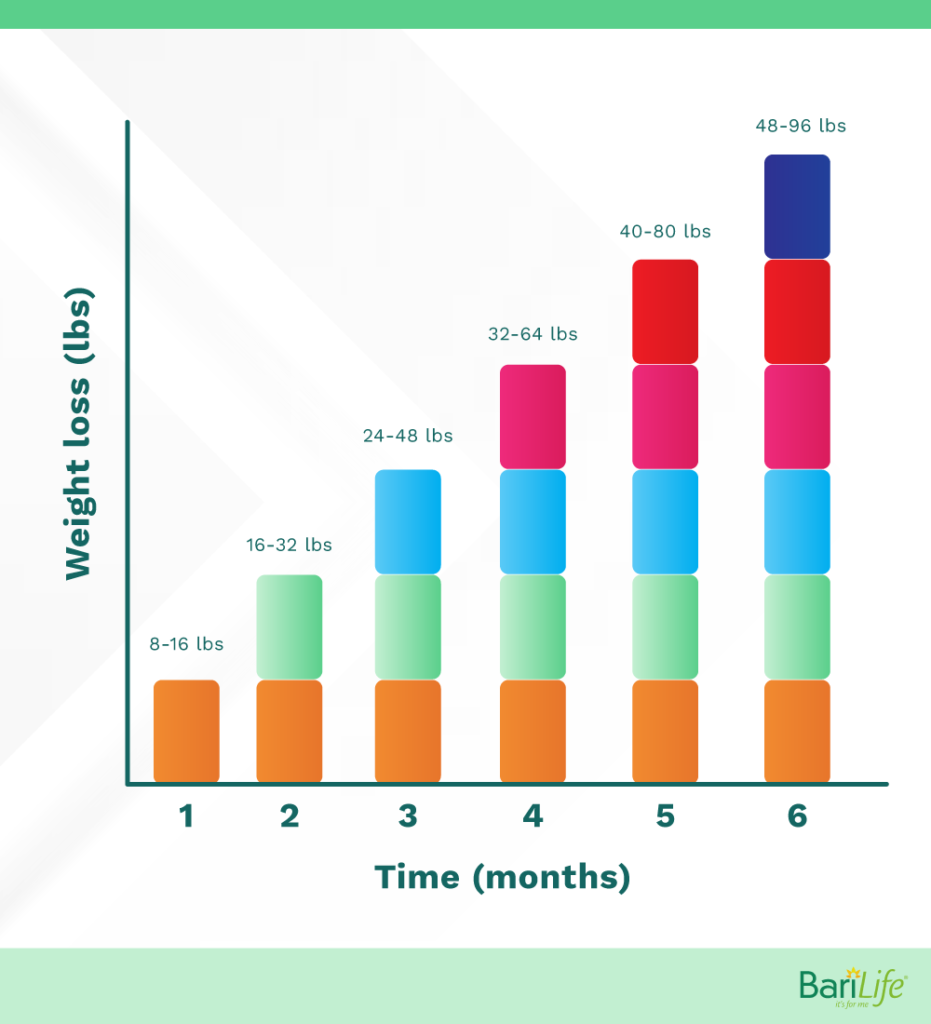
The most weight is lost in the first month after surgery due to a change in eating habits and the loss of water weight. After that, you can expect to average a loss of between 8 and 16 lbs a month for the first 6 months. Most patients generally have a total weight loss of around 60% of excess body weight after a year.
Weight loss tapers off after 6 months, but adding healthy lifestyle interventions can help.
Long story short – the average monthly weight loss after gastric sleeve surgery is 8 to 16 lbs. Weight loss continues after 6 months but is less rapid. Gastric sleeve generally results in a total weight loss of around 60% of excess weight after a year.
What is gastric sleeve surgery?
A gastric sleeve is a weight loss surgery that removes 75-80% of your stomach. Your stomach becomes a long-sleeve tubular shape which restricts how much food you can eat. Since the stomach is considerably smaller, you feel full faster.
Another benefit of gastric sleeve surgery is the effect of reducing hunger hormones. This results in a decreased appetite and food intake.
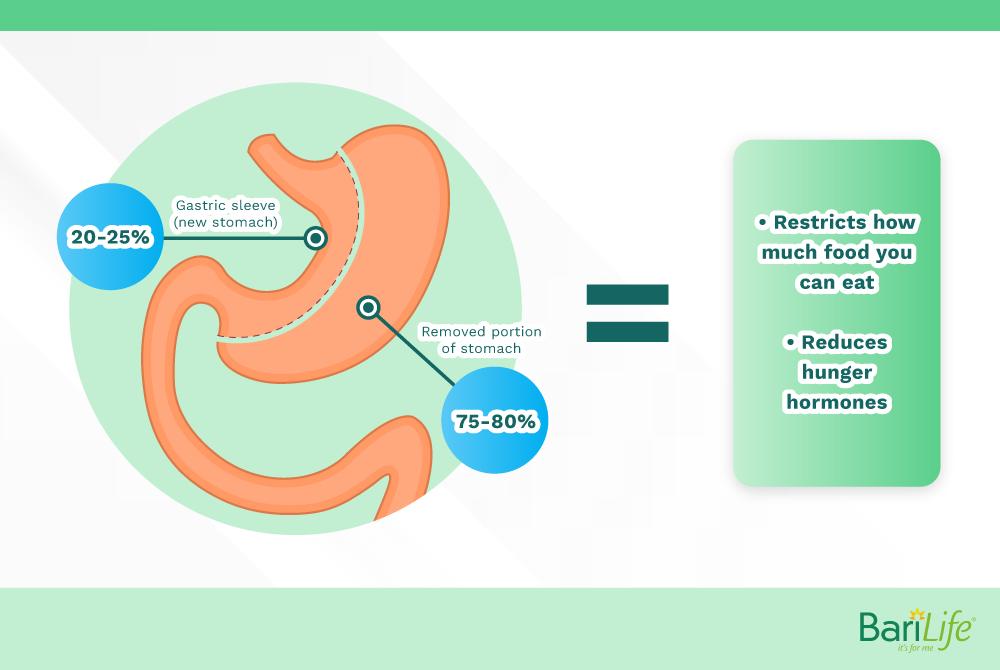
This surgery is one of the most common bariatric surgeries because it supports a considerable amount of weight loss in a short period of time. The average monthly weight loss after gastric sleeve is significant – resulting in up to 65% of excess weight loss 2 years after surgery.
How do I know how much weight I have to lose?
You can expect to lose around 60% of excess weight within the first year following gastric sleeve. But what does excess weight mean and how is it calculated?
Excess weight is the additional weight you carry around that is above your ideal weight. It is your current weight minus your ideal weight.
Excess weight = current weight – ideal weight.
Say you weigh 400 lbs and your ideal weight is 175 lbs. With the above formula, you’d find that you have 225 lbs of excess weight.
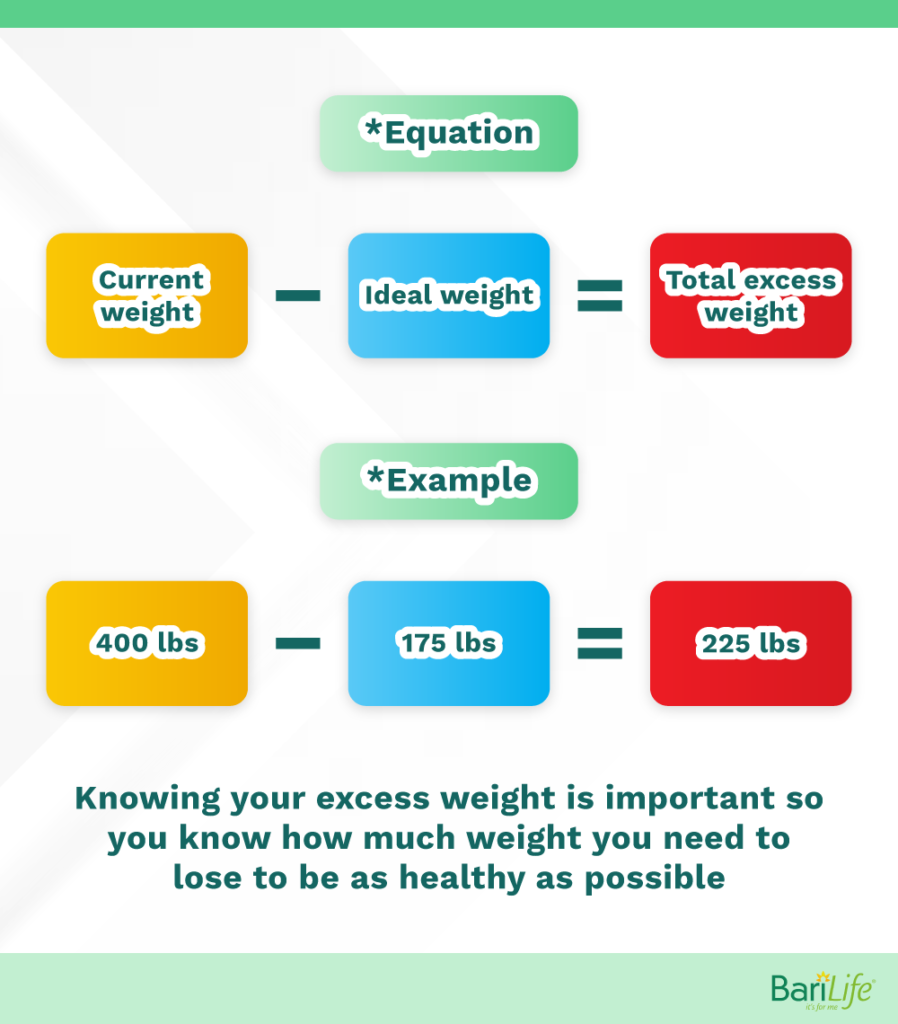
With gastric sleeve surgery, you can expect to lose around 60% of excess weight within the first year. In the example above, the patient could lose around 135 lbs.
Plugin your own numbers with our simple weight loss calculator to see how much you could lose.
How much weight will I lose each month?
During the first month following surgery, patients generally meet or exceed the average monthly weight loss after gastric sleeve. With a change in eating habits and adherence to the post-surgical diet, most weight loss occurs in the first three months.
Most patients lose an average of 2-4 lbs a week for the first 6 months to a year following surgery. This results in an average monthly weight loss after gastric sleeve to be between 8 and 16 lbs.
While some patterns of weight loss occur after gastric sleeve, everyone is different. You may notice more or less weight loss in your unique situation.
Here’s a hypothetical example of the average monthly weight loss after gastric sleeve surgery. Remember, this will vary patient by patient depending on your excess weight.
Month 1 – You can expect to lose the most weight this month, sometimes up to 16 – 20 lbs.
Month 2 – Up to 15 lbs.
Month 3 – Up to 12 lbs. Patients average a loss of 48% of their excess weight at this point.
Month 4 – Up to 10 lbs.
Month 5 – Up to 7 lbs.
Month 6 – Patients average a loss of 50% of their excess weight at 6 months after surgery.
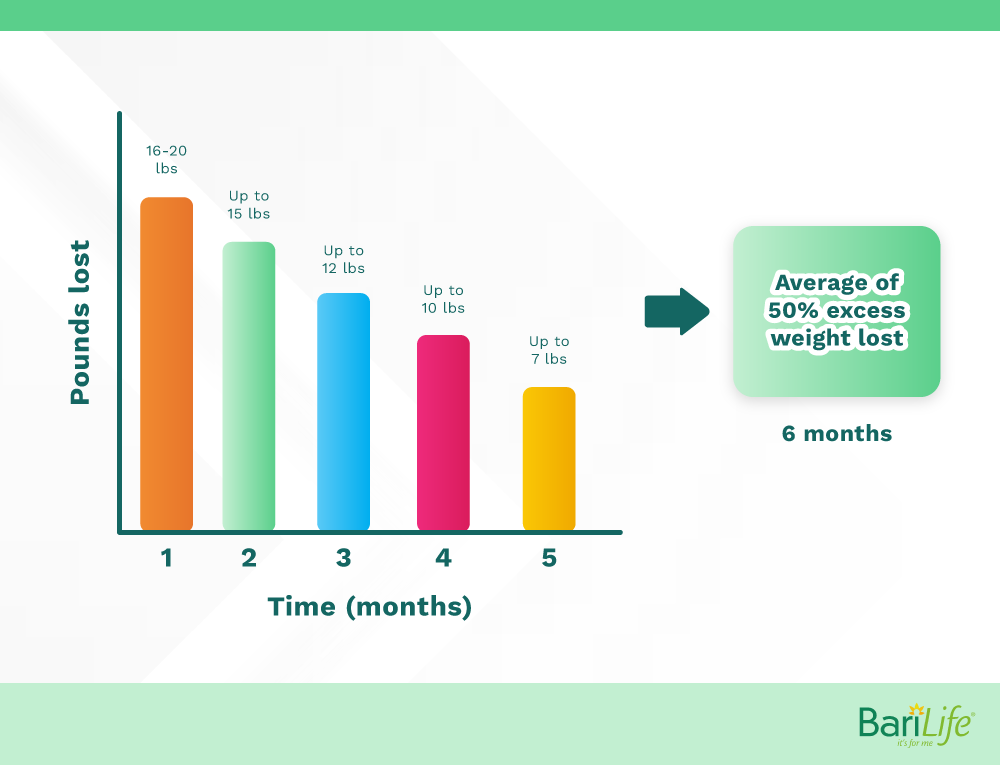
After one year post-surgery, most patients can expect a 60% decrease in excess weight. At the two-year mark, 65% of excess weight occurs in most patients.
Notice that the average monthly weight loss after gastric sleeve decreases the longer after surgery. Then at month 6, the rate of weight loss slows even more. While weight loss still occurs, it is at a slower rate than in previous months.
To continue your weight loss long after surgery, adhere to your post-surgical diet and add healthy habits into your life.
Will I gain weight back after time?
Even with a high average monthly weight loss after gastric sleeve, some patients worry they will gain back the weight later on.
Research supports that when patients do regain their lost weight it is mainly due to not following a proper diet and not exercising. This shows weight gain after surgery is possible but not a guaranteed complication.
Proper nutrition, supplementation, and consistent exercise help combat weight gain after gastric sleeve. One area patients don’t consider is supplementation. Following surgery, you’ll need to take a supplement for life. This supports your body’s ability to absorb essential vitamins and minerals.
Bari Life has a complete multivitamin that includes everything you need after gastric sleeve. Proper supplementation helps you feel better, adhere to your proper diet, and maintain lasting weight loss. Check it out here.
If you find your weight creeping back up, start by looking at your daily intake. Here are some things to avoid:
- Sugary drinks
- Alcohol
- Excess snacking
- Added sugars

While what you eat is important, how you eat is just as vital. Be mindful of your serving sizes, eat mindfully, and chew your food well.
Gaining weight back after time is a valid concern going into surgery. While there is a potential for weight gain, it is not guaranteed to happen. Proper nutrition, exercise, and supplementation can support your body in maintaining lasting weight loss.
How to keep weight loss going after gastric sleeve
After your gastric sleeve, there are a variety of habits you can begin to support continued weight loss.
One habit is exercise. Exercise plays a significant role in continued weight loss after gastric sleeve surgery.
For the first month after surgery, walking is the only exercise you should do. Walking helps promote healing and maintaining some cardiovascular fitness. You just need to be mindful of the timing and intensity of your exercise. Four to six months after surgery you can resume most exercise activities, including cardio and weight lifting.
Diet is another way to continue losing weight after surgery. Following your post-op diet is essential.
To refresh, here is the 4 phase diet approach following gastric sleeve:
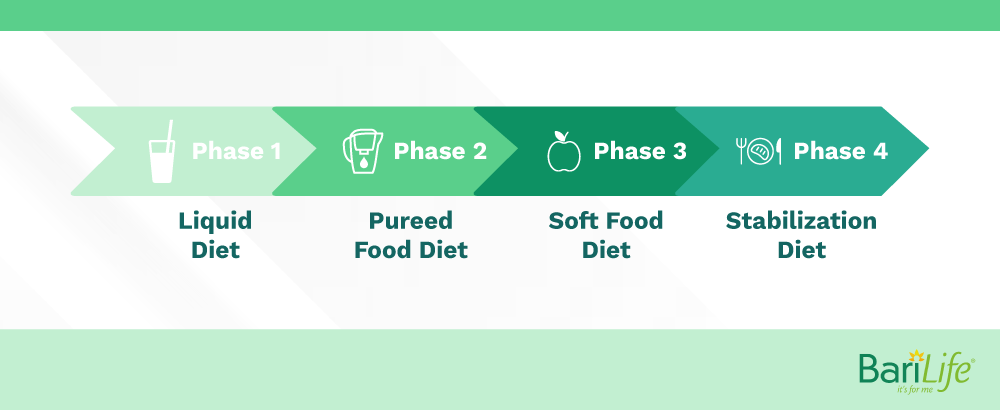
- Phase 1 – Full liquid
- Phase 2 – Pureed food
- Phase 3 – Soft food diet
- Phase 4 – Stabilization diet
While adhering to this is important, there are other habits that also support weight loss.
- Avoid sugary drinks and added sugars in food products. This is a big change that can have a significant impact on your weight
- Chew your food thoroughly and eat mindfully
- Know appropriate portion sizes
Supplementation also supports continued weight loss. Since you need to take a multivitamin for life, choosing one that is tailored to you is important. Bari Life has a variety of comprehensive, easy-to-take vitamins made specifically for post-bariatric patients.

Need to Jump Start Your Diet Again?
Key takeaways
The average monthly weight loss after gastric sleeve is 8-16 lbs in the first 6 months after surgery. Patients average a 50% loss of excess weight in the first 6 months. At the one-year mark, patients average a 60% decrease in excess weight. An average of 65% decrease in excess weight occurs at the 2-year mark.
To support your continued weight loss, proper diet, exercise, and supplementation are essential.
If you start gaining weight after gastric sleeve and aren’t sure why – take a closer look at your lifestyle. See where you can make some changes. You can also learn more about why you may not be losing weight after gastric sleeve surgery here.





Hi, my name is Amy. Just had Gastric Sleeve Surgery 1 month ago, tomorrow…just wondering, as this was never told to me…what happens to the 80 percent of the stomach that is removed?? Do they take it out Laporascopically?
i just had my Gastric Sleeve done on April 13, 2024 and I was told that the do remove the part of the stomach they just cut off of the “new stomach”.